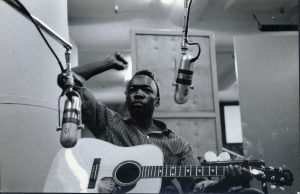So asks legendary Atlanta pastor the Reverend J. M. Gates in this 1929 Okeh Records recording (SFC# 78-10689):
Did You Spend XMas Day In Jail
Month: December 2009
Christmas Recordings From WPAQ
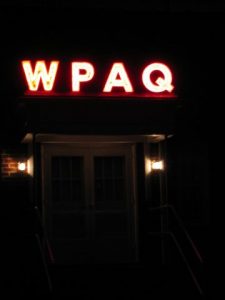 The Holiday Season is upon us again. The SFC’s Ralph Epperson Collection holds several recordings from WPAQ Radio that are related to, or were recorded on, Christmas Day.
The Holiday Season is upon us again. The SFC’s Ralph Epperson Collection holds several recordings from WPAQ Radio that are related to, or were recorded on, Christmas Day.
FT-8006 “Christmas Time is Coming”, WPAQ Merry-Go-Round Jam Session. (Glen McPeak, Rex Hodges, Walter McMillian, Amos Dawson, and Clyde Johnson.) December 19, 1981:
FT-8006 Christmas Time is Coming WPAQ Merry Go Round Jam Session. Glen McPeak, Rex Hodges, Walter McMillian, Amos Dawson, and Clyde Johnson December 19, 1981
FT-9745 “Ballad Of The Lawson Family”, WPAQ Merry-Go-Round, Kinney Rorrer and Sweet Sunny South from April 21, 1984:
FT-9745 Ballad Of The Lawson Family WPAQ Merry-Go-Round Kinny Rorrer and Sweet Sunny South April 21, 1984
Other notable recordings include FT-8074-FT-8076 – the WPAQ Merry-Go-Round on Christmas Morning Jam Session that took place December 25, 1982, with a variety of WPAQ area favorites:
FT-8075 Merry-Go-Round on Christmas Morning Jam Session December 25, 1982
Xmas 83 at Dena’s
Students, scholars, and fans of folklore often can’t help but romanticize the experiences of early field collectors, discovering lost tunes and musicians unknown outside their local communities. The music is just so compelling and raw and often very good, from the legendary Lomax (John and Alan) recordings of the 1930s to the astounding body of work collected by the scholar/musicians like Mike Seeger and John Cohen in the 1960s, and countless others whose collections remain tucked away in attics or housed in archives like the Southern Folklife Collection and in institutions across the country.
Hearing the music today offers glimpses to worlds of experience foreign to most listeners. The listener becomes a voyeur, peeking through the window into the homes and lives of the performers (and often the field recorders too) of a forgotten past. While the feeling of being “let in on a secret” is profound and exciting, regarding the documented performance as a “secret” or a private moment between a few individuals distances the listener, and the temporal difference between when the material was recorded to when it is shared with a larger listening audience only further emphasizes that distance. Instead of the field recording creating a cultural connection, it is exoticized to the point where such an experience (finding and recording lost or forgotten or ignored practitioners of a similarly lost, forgotten or ignored art form) seems impossible to replicate in the present, “modern” time. Thankfully there are those who refuse to relegate those experiences exclusively to the past. Instead, these individuals constantly seek to break down the barriers created by an Orientalized other represented solely by the sounds on a tape by finding the hands, faces, and minds behind the music.
Alice Gerrard and Andy Cahan spent many years in the late 1970s and early 1980s seeking out musicians in and around Galax, Virginia and Toast, North Carolina. They developed strong relationships with some of these regions’ greatest living musicians, including Luther Davis, Roscoe and Leone Parrish, and Tommy Jarrell. Cahan and Gerrard recorded hundreds of hours of interviews, lessons, jam sessions they shared with these musicians. They learned countless tunes these performers but they also became their very good friends, sharing meals, helping with chores when health problems interfered, and even sharing holidays with them like a family. In 1983, Cahan and Gerrard spent Christmas day with Tommy Jarrell and his daughter Ardena “Dena” Jarrell at her house in Toast, NC, eating, drinking eggnog and, of course, playing music. They had such a good time that the ensemble composed a song to commemorate the event, “Xmas 83 at Dena’s.”
I’m including 3 clips here: an introduction, a clip of the song itself, and a brief moment after the song when Tommy, Andy and Alice talk about composing fiddle tunes and recording. Please enjoy. Sounds like they did.
Xmas83 at Dena’s_intro
XMas at Dena’s
Xmas83 at Dena’s_outro
All clips from audiocassette FS-8341: Tommy Jarrell with Alice Gerrard and Andy Cahan, recorded on 25 December 1983, in Toast, N.C. From the Alice Gerrard Collection.
The ongoing digitization project Fiddles, Banjos and Mountain Music: Preserving Audio Collections of Southern Traditional Music, is made possible by a grant from the National Endowment for the Humanities.
Photo Of The Week: John Lee Hooker
The Stanley Brothers Live At Ash Grove, 1962
 Armadillo World Headquarters, CBGB’s, The Bluebird Café, Tipitina’s, Whisky A Go-Go, the Village Gate, all names of landmark live music venues. These spaces are inseparable from the music scenes fermented inside their walls, and the proper names themselves have come to represent far more than the physical structures. The words conjure structures of feeling of specific eras (whether the business is still open or not), reflecting cultural and musical histories that reach far beyond the individuals who actually experienced these spaces, becoming almost mythological in their stature. The lists of musicians who played on the stages, the performances and collaborations that seem out of fanboy dreams, and the glimpses into these worlds through scattered photographs, films, and audio recordings only add to the ethereal nature of their reputations. The reality of struggling small businesses operating on the fringes of society and exhausted musicians toiling to keep their heads above water get lost in the narrative, but the influence of these venues depends more on the dream than the reality.
Armadillo World Headquarters, CBGB’s, The Bluebird Café, Tipitina’s, Whisky A Go-Go, the Village Gate, all names of landmark live music venues. These spaces are inseparable from the music scenes fermented inside their walls, and the proper names themselves have come to represent far more than the physical structures. The words conjure structures of feeling of specific eras (whether the business is still open or not), reflecting cultural and musical histories that reach far beyond the individuals who actually experienced these spaces, becoming almost mythological in their stature. The lists of musicians who played on the stages, the performances and collaborations that seem out of fanboy dreams, and the glimpses into these worlds through scattered photographs, films, and audio recordings only add to the ethereal nature of their reputations. The reality of struggling small businesses operating on the fringes of society and exhausted musicians toiling to keep their heads above water get lost in the narrative, but the influence of these venues depends more on the dream than the reality.
The Eugene Earle Collection is full of recorded artifacts that help fill out the narratives, exposing more of the reality but adding to the dream at the same time. The country music parks like New River Ranch (featured here a week ago) offered one kind of performance opportunity for the traditional country and mountain music in the 1950s and 1960s, but the folk clubs, coffeehouses and college stages offered another. The Ash Grove is one of the latter.
Founded in Hollywood by Ed Pearl in 1958, the Ash Grove was unprecedented in the variety of folk legends and young artists that shared the stage. The club offered many musicians from the South and East their first opportunities to find audiences on the West Coast. Doc Watson, The Country Gentlemen, Mississippi John Hurt, Son House, Muddy Waters, Pete Seeger, June Carter, Johnny Cash, Phil Ochs, Joan Baez, Johnny Otis, Ramblin’ Jack Elliott, Ian and Sylvia, Sonny Terry, Brownie McGee, New Lost City Ramblers, The Weavers, The Greenbriar Boys, Lightnin’ Hopkins, Barbara Dane, Holly Near, Arlo Guthrie, Mance Lipscomb, Guy and Candie Carawan, John Jacob Niles, Bukka White, and Kris Kristofferson all played the Ash Grove. As did Oscar Brown, Jr., Chuck Berry, James Booker, Ravi Shankar, Mongo Santamaria, Miriam Makeba , and the Virgin Islands Steel Band. Ry Cooder had his first performance there when he was 16 and the Stanley Brothers, featured in the clips below, performed there numerous times throughout the 1960s. The Ash Grove closed in 1973, possibly as a result of arson attacks by those who disagreed with the venues left leaning social and political affiliations, but it’s legacy lives on in the collective cultural memory, thankfully bolstered by recordings like those in the Eugene Earl Collection here at the SFC.
Digitized for the project Fiddles, Banjos, and Mountain Music: Preserving Audio Collections of Southern Traditional Music, the following clips come from FT-12936 of the Eugene Earl Collection. The Stanley Brothers in this incarnation include Carter Stanley on guitar, Ralph Stanley on banjo, Vernon Derek on fiddle, Curly Lambert on mandolin, Roger Bush on bass. Recorded August 30, 1962, the performance includes a variety of traditional mountain music, bluegrass standards, and Stanley Brothers originals.
More recordings from the Ash Grove to come, but for now enjoy the Ash Grove intro with the Stanley Brothers kicking off the show with “Late Last Night”: late last night_stanley bros
and Carter’s introduction of “Drifting too Far From the Shore” with a description of the “Monroe Sound” and a touching acknowledgement of Charlie Monroe’s contribution to country music: Drifting too far_Stanley Brothers_mo
The ongoing digitization project Fiddles, Banjos and Mountain Music: Preserving Audio Collections of Southern Traditional Music, is made possible by a grant from the National Endowment for the Humanities.
The Bosses' Songbook
Here’s an interesting new arrival to our book collection:
The Bosses’ Songbook: Songs to Stifle the Flames of Discontent is “a collection of modern political songs of satire”, edited by Dave Van Ronk and Richard Ellington, self-published by Ellington in New York in 1959 and dedicated “to our constant companion, J. Edgar Hoover”.
Below is the seasonally appropriate “Twelve Days of Marxmas”, which should be a big hit at your office Christmas party:
Photo Of The Week: Clancy Brothers and Tommy Makem
Tom Clancy, Tommy Makem, and Liam Clancy in a 1962 Columbia Records promotional photo.
The Monroe Brothers Live at New River Ranch, 1955
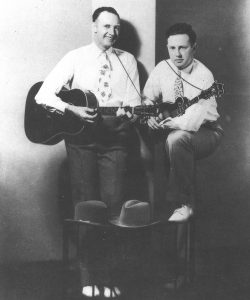 To follow up on the recent photo-post with Bill Monroe, we offer a live recording of the Monroe Brothers from New River Ranch, May 8, 1955.
To follow up on the recent photo-post with Bill Monroe, we offer a live recording of the Monroe Brothers from New River Ranch, May 8, 1955.
With the rise of Rock and Roll and Nashville’s turn towards hyper-stylized Countrypolitan, country music parks and campgrounds of the 1950s and 1960s acted as catch-all venues for performers and fans in the still very active hillbilly and honky-tonk music scenes. Located just across the Pennsylvania border in Rising Sun, Maryland, New River Ranch welcomed everyone: old-time legends, honky-tonk heroes, and homegrown fiddle bands.
With an open-air stage and wooden planks for seats, picnic suppers and rudimentary PA, what New River Ranch lacked in amenities, it made up tenfold with the music. On the urging of Mike Seeger, Ralph Rinzler first visited New River Ranch in 1954 to see Bill Monroe and the Bluegrass Boys; an experience that profoundly affected the future of not only Rinzler and Monroe, but also the future of folk and country music in ways that continue to resonate today.
The Eugene Earle Collection holds a treasure trove of live recordings from New River Ranch and countless other parks and venues across the U. S. A. Digitized for the project Fiddles, Banjos, and Mountain Music: Preserving Audio Collections of Southern Traditional Music, these clips come from a reel-to-reel tape likely recorded by Gerald Mills on May 8, 1955, featuring a rare 1950s reunion by The Monroe Brothers, Charlie and Bill, whose bands both performed regularly at the park, just two years before Charlie’s retirement from music in 1957. The raw beauty of the setting and the enthusiasm of the audience and the performers shine through on these recordings. “Nine Pound Hammer” is the brothers’ classic rendition of the Merle Travis tune, including the ferocious first licks of Bill’s chiming mandolin solo. “This World is Not My Home” is their rendition of the gospel tune popularized by the Carter Family. The vocal harmonies are stunning. Please enjoy.
bill and charlie monroe_9 pound hammer_clip
bill and charlie monroe_this world is not my home_clip
Both clips from SFC field tape FT-12917 in the Eugene Earle Collection.
The ongoing digitization project Fiddles, Banjos and Mountain Music: Preserving Audio Collections of Southern Traditional Music, is made possible by a grant from the National Endowment for the Humanities.
Photo of the Week: Bill Monroe and Doc Watson
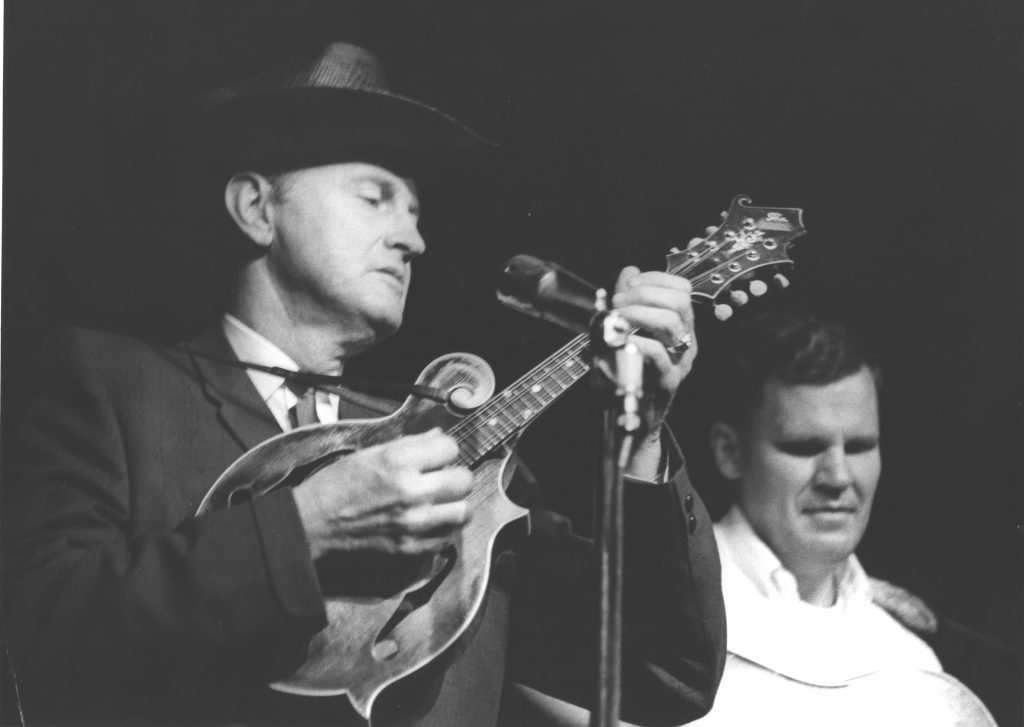 Bill Monroe performing with Doc Watson, 1963. Some highlights from their performances together are collected on the excellent Smithsonian Folkways CD Live Duet Recordings 1963-1980.
Bill Monroe performing with Doc Watson, 1963. Some highlights from their performances together are collected on the excellent Smithsonian Folkways CD Live Duet Recordings 1963-1980.
Bess Lomax Hawes, 1921-2009
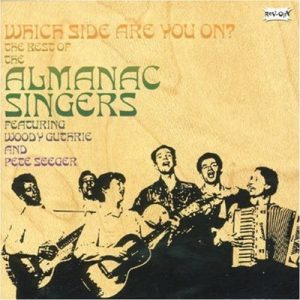 We were saddened to hear of the recent passing of singer, songwriter, and folklorist Bess Lomax Hawes. The former member of the Almanac Singers and director of the Folk Arts Program at the National Endowment for the Arts was 88 years old. During her tenure at the NEA (1976-1992), Hawes developed the very successful National Heritage Fellowship program, among other major accomplishments.
We were saddened to hear of the recent passing of singer, songwriter, and folklorist Bess Lomax Hawes. The former member of the Almanac Singers and director of the Folk Arts Program at the National Endowment for the Arts was 88 years old. During her tenure at the NEA (1976-1992), Hawes developed the very successful National Heritage Fellowship program, among other major accomplishments.
You can watch the full version of Beth Lomax Hawes’ 1968 film on African-American girl’s singing games, Pizza Pizza Daddy-O, at the always recommended Folkstreams.net.

